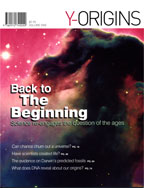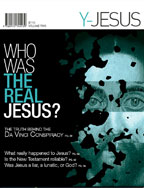WHAT ARE THE ODDS?
Why is Only Earth Suitable for Life?
In his movie Signs, M. Night Shyamalan presents us with a priest (played by Mel Gibson) who has lost his faith. Through the death of his wife, the priest has come to the conclusion that life is random. He has decided that he will no long pretend to see God in the picture.
As Shyamalan zooms in his lens, he shows us that life is without focus: there is no recognizable pattern. But typical of Shyamalan, he turns the lens one more screw to the right, and at this magnification a pattern emerges. Gibson’s character is able to see the hand of a great designer lurking behind all that had seemed random. His wife’s dying words, his daughter’s obsession with water, his son’s asthma —everything served a larger purpose.
At the end Mel Gibson returns to the priesthood and makes a blockbuster called The Passion of the Christ. Well, not exactly, but his character comes full circle—from faith to skepticism and back to faith. Meanwhile, Shyamalan takes his audience on the same circuitous journey, exploring issues of design and higher purpose in the world.
In many ways the evidence for intelligent design of the universe has come full circle. When early humans looked at the heavens, they could not escape the concept of a creator. In fact, until the 1500s, most people believed in the ancient astronomer Ptolemy’s teaching, that Earth was the center of the universe.
But, in the 16th century, Copernicus showed that Earth revolved around the Sun. Suddenly our planet seemed less special. Some astronomers looked out at the universe through telescopes and deduced a creator was unnecessary. Their argument for a materialist worldview was energized by the belief in an ordinary Earth.
Although the founders of modern astronomy strongly believed that the universe was the work of a cosmic genius, these later followers saw the cosmos as totally autonomous and independent of a designer. Copernicus, a strong believer in God, couldn’t have disagreed more with such an assumption, and would have taken exception to it.
In the 19th century, this belief in an ordinary Earth became popularized as the “Copernican Principle.” This principle has become the bedrock for a materialistic view of the world. However, in the latter part of the 20th century evidence began pouring in about the remarkable fitness of Earth for life.
Scientists have learned that only an exceptionally fine-tuned planet like Earth has the necessary ingredients to harbor life. Additionally, our solar system and galaxy, as well as our entire universe, appear designed to support intelligent life.
The odds that such fine-tuning could have occurred by chance is not just unlikely–scientists say it is virtually impossible.
Endnotes | Next
|




